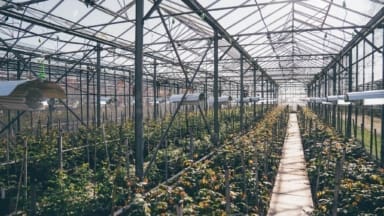
David Austin Roses is a world-leading breeder of fine English Roses and has been since its founder David C. H. Austin OBE released his very first rose back in 1961, Constance Spry. The family business, based in Shropshire counts more than 200 varieties of roses to its name.
The biomass boiler provides 100% of the heating for the rose-breeding greenhouses. The heat is crucial for the germination of seeds and the growth of new rose seedlings. “The current set up heats a one-acre glass area and it has been running for nine years. As well as being cost-effective and renewable energy, our biomass has completely removed our reliance on heavy fuel oil to provide this heating”, explains, Carl Bennett, Breeding Manager, David Austin Roses.
Committed to sustainable gardening practices and conserving the environment, the biomass installation is an important part of David Austin’s ESG strategy – Bloom. The Bloom strategy outlines the nursery’s commitment to the environment, which covers; use of chemicals, energy, water, waste and material use.
- For their production facility, offices and cold stores, the company installed electro-voltaic solar panels across a number of roofs. The panels are generating around 50% of peak electrical needs, increasing to 80% of their needs in quieter periods.
- Early adopters of non-neonicotinoid pesticides in their production beds, the company now host several beekeepers who have hives around the nursery. The company is working to minimise reliance on herbicides by utilising alternative husbandry methods like mechanical weeders, bark toppers, membranes, cover crops and field rotations.
- The company invested in a water capture and recycling system, meaning that they capture 60-80% of the rainwater and irrigation water that falls on the nursery, which provides at least 90% of the annual water consumption. Additional water reservoirs service the nursery, which have also provided a new habitat for many wildfowl.
- The distinctive David Austin Roses 6 litre pot is now formed of post-consumer waste and is fully recyclable at kerbside. The distinctive slot in label is also fully recyclable. The mail order packaging is also recyclable, with the internal “plastic” bag made from potato starch. According to the company their use of black plastics has been reduced to zero.

